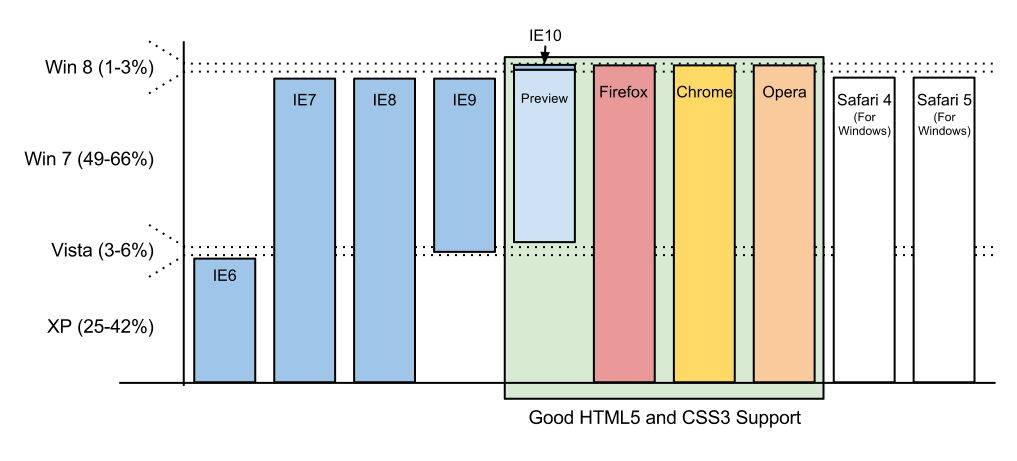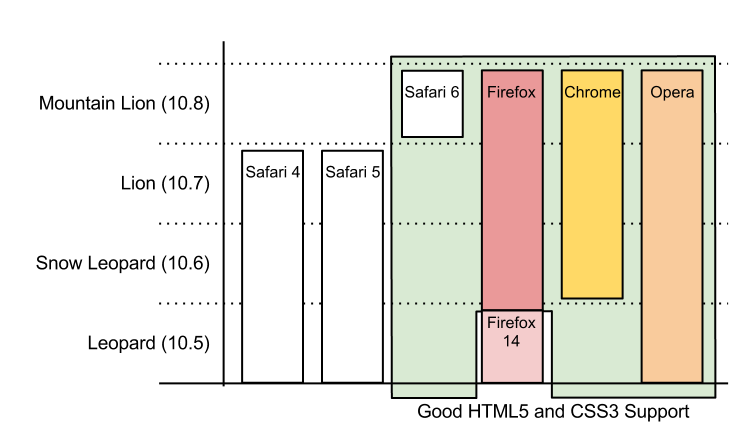I’ve been doing a little bit of web development outside of Asteroid Outpost recently, and the question came up: Which browsers should I support? The obvious answer is “All popular browsers”, which got me looking at stats. People still use IE6, 7 and 8? What?! Even IE9 doesn’t support half the things I want to do. I’ll stop here and say that even though I’ve been a Firefox fan for years, I’ll try to keep this as un-ranty as possible.
Before I go into the details, what is HTML5? I’m sure you’ve heard everyone raving about it, and with good reason. It’s pretty cool. Essentially, it’s a collection of tools that can be used to make a rich web experience, as well as improved standard ways to write web code. This includes everything from standard ways to embed videos and music, Canvas, Vector Graphics, CSS3 support which includes: Transitions, Animations, and other styles that were previously difficult to achieve. The catch is: HTML5 is still a draft, a work in progress. And because of this, each browser in the market supports different parts of the draft. Various sites on the internet will measure how well the browsers support the new HTML5 standards, and many web developers, myself included, are using the HTML5 standards long before they will be approved.
Major browsers that support a good chunk of HTML5 are: Internet Explorer 10, Chrome, Firefox, Safari 6, and Opera. Note that I didn’t include version numbers for Chrome, Firefox, and Opera, I will go into why later on.
IE10 has great support for HTML5 and it’s been out for many months now, so why don’t IE users upgrade? Well… some of them can’t. IE10 used to require Windows 8, but it was released for Windows 7 recently. Even if every Windows user on Win7 & 8 upgraded to IE10, that’s still a maximum of ~60% of the Windows market covered. 60%! So if I write an HTML5 application, only 60% of my IE viewers will be able to view it? Here’s a graph I compiled showing the browser version ceiling based on your operating system, scaled (roughly) by the number of users using the operating system.
I think I speak on behalf of all web developers when I say: If you’re on XP or Vista still, please Please PLEASE either upgrade your operating system to at least Windows 7. If you’re already using Win7 or 8 and are using IE, make sure it’s version 10. The alternative is to start using Chrome, Firefox, or Opera.
Here’s where version numbers come back in: Chrome, Firefox, and Opera work across all of these different operating system versions, and they all automatically update to the latest version. There is absolutely no reason you should be running any version other than the latest with these browsers because it’s not limited by your operating system version.
Internet Explorer 10 isn’t the only one that requires the latest Operating System version, look at this graph I compiled showing the version ceiling for browsers based on Mac OSX’s version, (not scaled based on usage):
My hypothesis is that operating system (OS) developers, Microsoft and Apple, design their browsers to take advantage of the new operating system features, which causes their browsers to become incompatible with earlier versions of their OSes. I bet this is on purpose to not only make their latest browser work better than their competitors (with the new OS features), but also to force users to upgrade and give them more money. I’m not opposed to making a little money, but I don’t think they are considering the effect it’s having on internet at large.
Can you use HTML5 today? Sure, if you want to ignore 20-40% of your viewers. Realistically, businesses can’t use HTML5 today. It’ll be 3 to 5 years before more than 90% of users upgrade from XP, Vista, or OSX:Lion and are able to view HTML5 material like the rest of us. That makes me very depressed.
/rant

